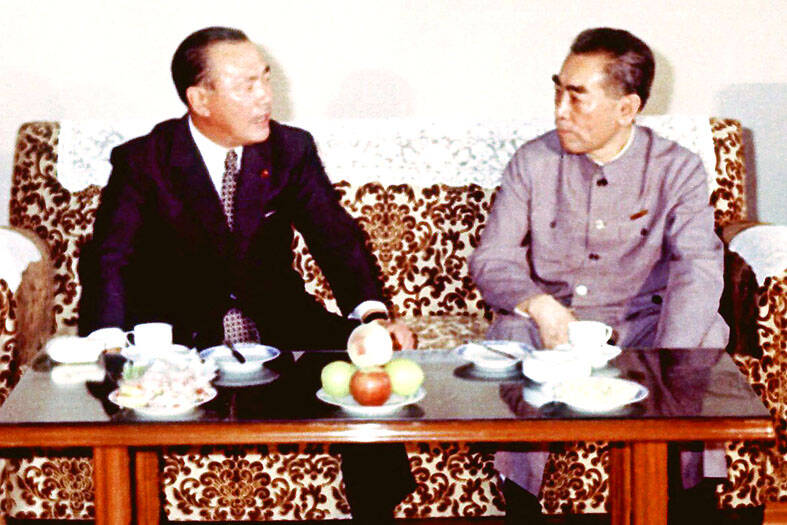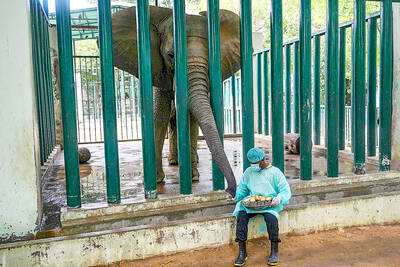The former Japanese prime minister who normalized relations with China 50 years ago feared for his life when he flew to Beijing for the high-stakes negotiations at the height of the Cold War, his daughter, a former Japanese foreign minister, said.
Kakuei Tanaka’s mission to normalize relations with China just two months after taking office was a huge gamble, Makiko Tanaka said in an interview with The Associated Press ahead of the 50th anniversary on Thursday of the historic communique that Kakuei Tanaka signed with his counterpart, Zhou Enlai (周恩來).
The then-prime minister told his daughter before his departure that he would resign if his mission failed, said Makiko Tanaka, who was minister of foreign affairs and in other key posts from 1993 to 2012.

Photo: AFP
Opposition was so fierce in Japan, she said, that some ruling party hawks came to their home the day before the trip to try to stop him from leaving.
He told his daughter that he feared being poisoned in China, which was a largely closed country in 1972.
Earlier that same year, then-US president Richard Nixon had made his visit to Beijing that would transform China’s position in the world. His trip led to the US establishing diplomatic relations with China in 1979 and the parallel severing of formal ties with Taiwan.
Much has changed, too, in the China-Japan relationship over the past half-century. The neighbors enjoy deep business and cultural ties. Japan has given China more than US$25 billion in development aid over the years, and China is Japan’s biggest trade partner.
However, the underlying tension that marked Kakuei Tanaka’s diplomatic foray remains.
China, a relative backwater then, is now the world’s No. 2 economy and a growing military power. Tensions surround Beijing’s rivalry with Washington and its increasingly assertive activity in the region, especially around Taiwan.
Japan considers China a security threat and is particularly worried about Chinese naval activity around Japanese-controlled islands in the East China Sea that Beijing also claims.
Top-level visits have stalled in the past few years, and Japan has been steadily building its military, largely in response to China.
Japanese Prime Minister Fumio Kishida’s government has pledged to further reinforce military power and to nearly double its spending over the next five to 10 years.
“Japan’s alliance with the United States is a linchpin of our diplomacy, but we should not isolate China,” Makiko Tanaka said.
She raised worries about US-led groupings of like-minded democracies, including Japan, as a counter to China, and cautioned against pushing Beijing toward closer ties with Russia.
“We are just banding together and being confrontational” toward China, said Makiko Tanaka, who was foreign minister from 2001 to 2002 under then-Japanese prime minister Junichiro Koizumi.
She criticized US House of Representatives Speaker Nancy Pelosi’s visit to Taipei last month for escalating tensions.
Wang Jiaxun (王家馴), president of the China Enterprises Association in Japan, which includes 150 Chinese companies, acknowledged difficulties, but said the neighbors need each other as business partners.
“China and Japan have thousands of years of up-and-down relations,” said Wang, whose association sponsored a weekend Japan-China festival in Tokyo in hopes of improving rocky ties.
Beijing has not forgotten Tokyo’s support after the 1972 normalization, and even though china has become a major power, the two countries can learn from each other, he said.
China can provide a huge market for Japan and further contribute to the Japanese economy, he added.
When Kakuei Tanaka, who died in 1993, made his trip, memories were fresh in Beijing of Japanese brutality during the first half of the 20th century. There was also opposition from anti-communist lawmakers in Tokyo.
Makiko Tanaka accompanied her father on many foreign trips, but he refused to take her to Beijing because of safety worries.
The main sticking points in 1972 were Japan’s apology for wartime aggression and differences over Taiwan — issues that strain relations today.
Kakuei Tanaka was determined to make amends with China and change the state of the relationship with a country he saw as a growing power, his daughter said.
He believed energetic diplomacy was the only way his resource-poor country could rise from the devastation of the war and survive global competition.
Makiko Tanaka quoted her father as saying that “leaving the China issue dangling is not good for Japan’s future.”
She said her father “was ready to lower his head and apologize to China [over Japan’s wartime atrocities] to create a win-win relationship for Japan’s major benefit.”
Contrary to his worries, Kakuei Tanaka was treated in China with extreme hospitality.
His biggest relief centered on Zhou’s pledge to waive China’s right to seek war compensation, which he said saved Japan from going bankrupt. Makiko Tanaka said the waiver was in exchange for Japan’s pledge to sever formal ties with Taiwan.
The East China Sea islands dispute was not part of the 1972 communique. Kakuei Tanaka raised the issue, but Zhou said he did not want to discuss it, diplomatic records released by the Japanese Ministry of Foreign Affairs showed.
In response to Chinese concerns, the Japanese side strengthened an apology over the country’s wartime aggression in the communique.
Makiko Tanaka said an improvement in the current political relationship between Beijing and Tokyo is hopeless, but she is pushing for deeper ties in the private sector. She has been invited to speak at Beijing’s Tsinghua University, and she is planning to invite a Chinese delegation to visit her father’s tomb in his hometown of Niigata later this year.
“If business, scientists and cultural exchanges were prompted more, there would be a sense of closeness” between the countries, Makiko Tanaka said. “Diplomacy is about people, and whether you can develop personal relations and talk when needed, but politicians who can do this are rare.”

NO EXCUSES: Marcos said his administration was acting on voters’ demands, but an academic said the move was emotionally motivated after a poor midterm showing Philippine President Ferdinand Marcos Jr yesterday sought the resignation of all his Cabinet secretaries, in a move seen as an attempt to reset the political agenda and assert his authority over the second half of his single six-year term. The order came after the president’s allies failed to win a majority of Senate seats contested in the 12 polls on Monday last week, leaving Marcos facing a divided political and legislative landscape that could thwart his attempts to have an ally succeed him in 2028. “He’s talking to the people, trying to salvage whatever political capital he has left. I think it’s

Polish presidential candidates offered different visions of Poland and its relations with Ukraine in a televised debate ahead of next week’s run-off, which remains on a knife-edge. During a head-to-head debate lasting two hours, centrist Warsaw Mayor Rafal Trzaskowski, from Polish Prime Minister Donald Tusk’s governing pro-European coalition, faced the Eurosceptic historian Karol Nawrocki, backed by the right-wing populist Law and Justice party (PiS). The two candidates, who qualified for the second round after coming in the top two places in the first vote on Sunday last week, clashed over Poland’s relations with Ukraine, EU policy and the track records of their

UNSCHEDULED VISIT: ‘It’s a very bulky new neighbor, but it will soon go away,’ said Johan Helberg of the 135m container ship that run aground near his house A man in Norway awoke early on Thursday to discover a huge container ship had run aground a stone’s throw from his fjord-side house — and he had slept through the commotion. For an as-yet unknown reason, the 135m NCL Salten sailed up onto shore just meters from Johan Helberg’s house in a fjord near Trondheim in central Norway. Helberg only discovered the unexpected visitor when a panicked neighbor who had rung his doorbell repeatedly to no avail gave up and called him on the phone. “The doorbell rang at a time of day when I don’t like to open,” Helberg told television

A team of doctors and vets in Pakistan has developed a novel treatment for a pair of elephants with tuberculosis (TB) that involves feeding them at least 400 pills a day. The jumbo effort at the Karachi Safari Park involves administering the tablets — the same as those used to treat TB in humans — hidden inside food ranging from apples and bananas, to Pakistani sweets. The amount of medication is adjusted to account for the weight of the 4,000kg elephants. However, it has taken Madhubala and Malika several weeks to settle into the treatment after spitting out the first few doses they